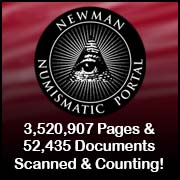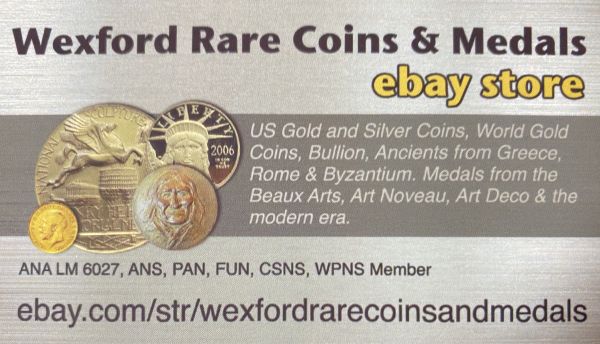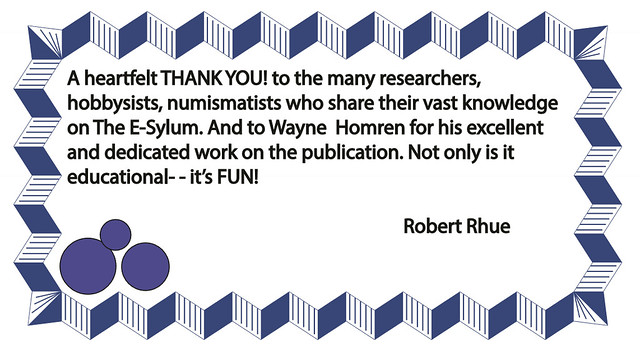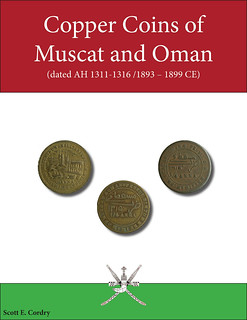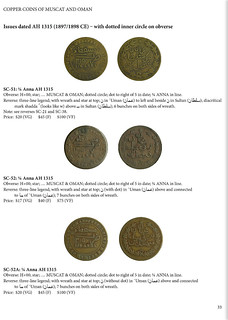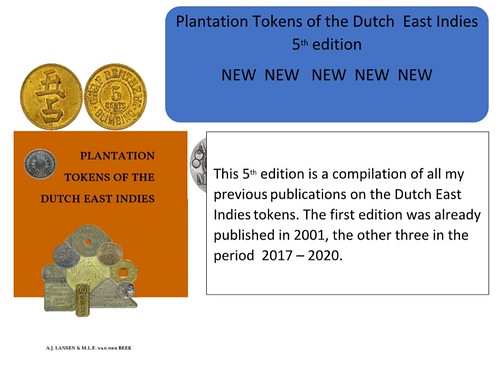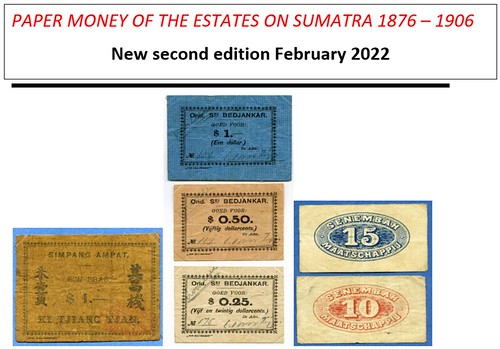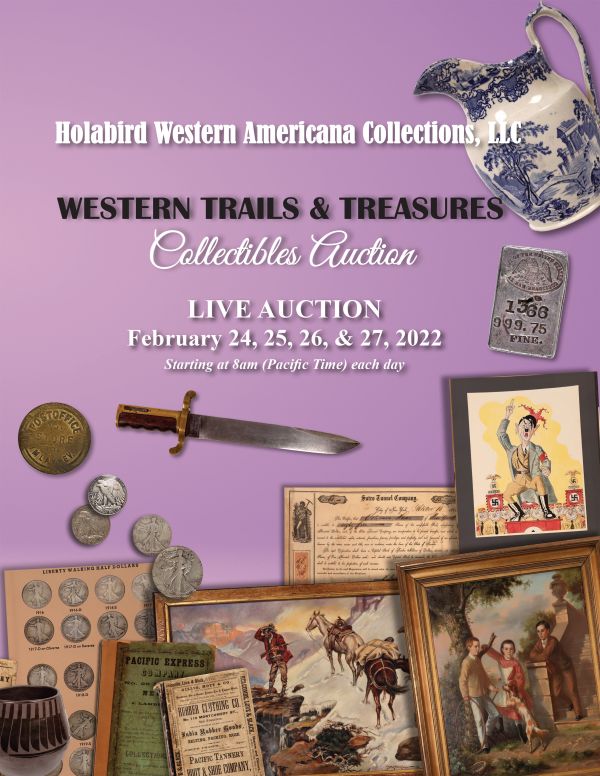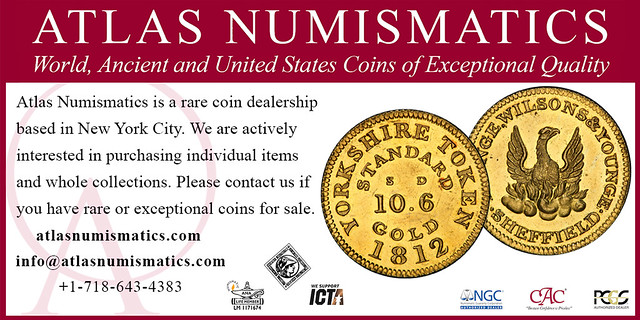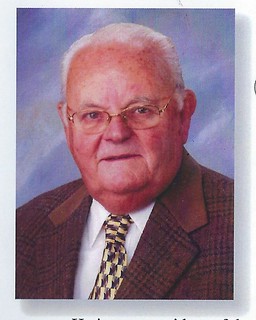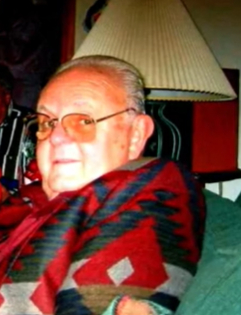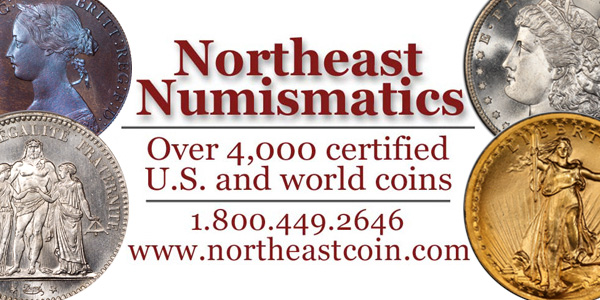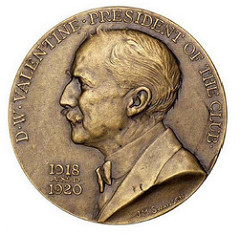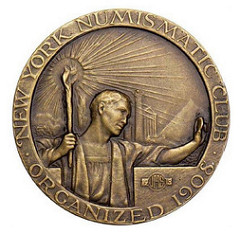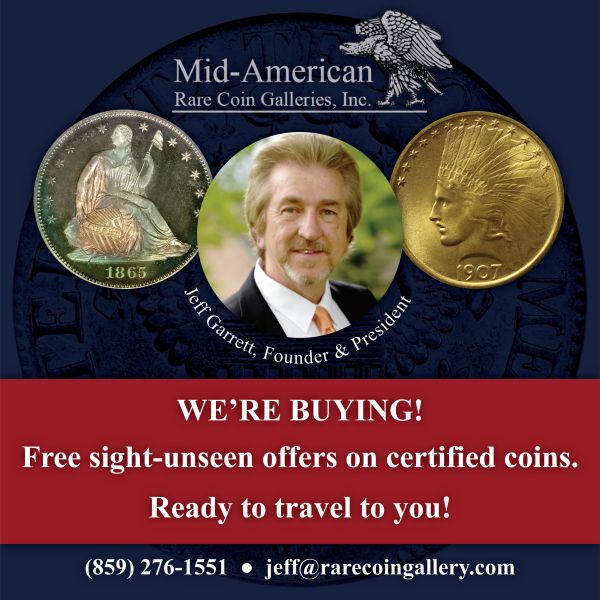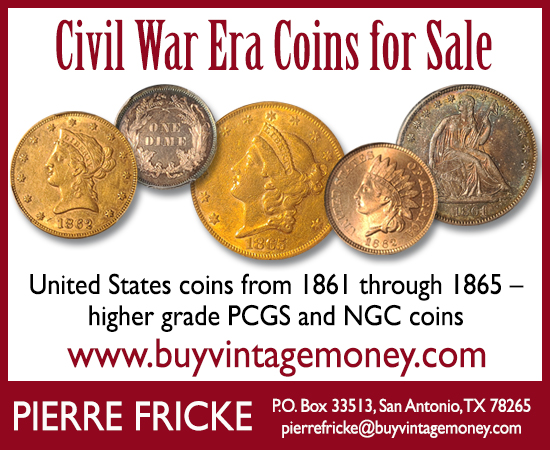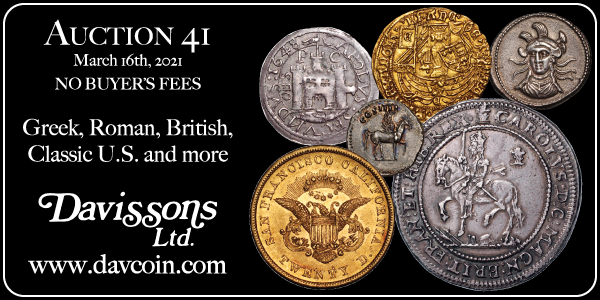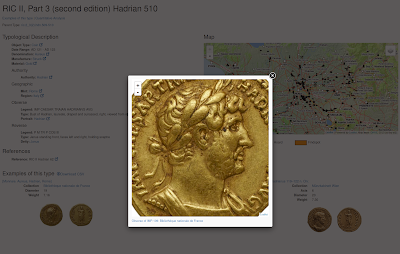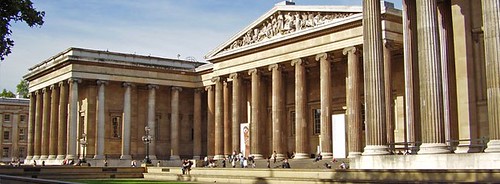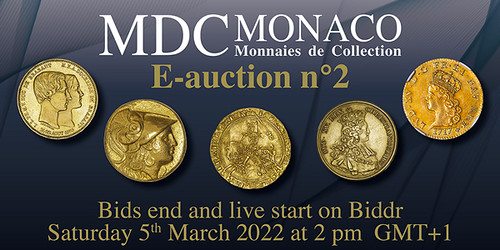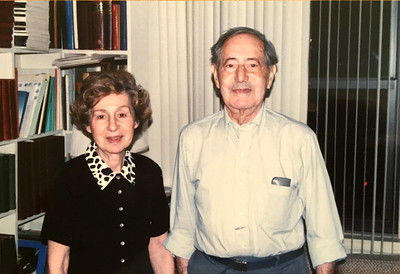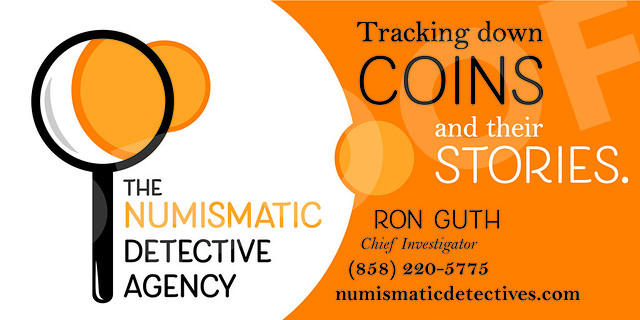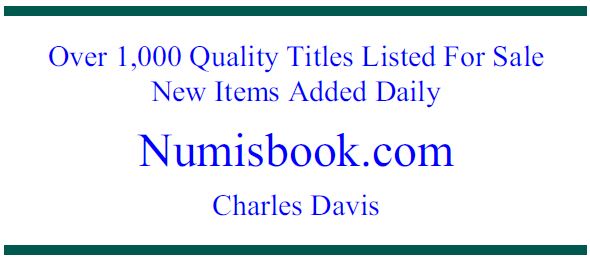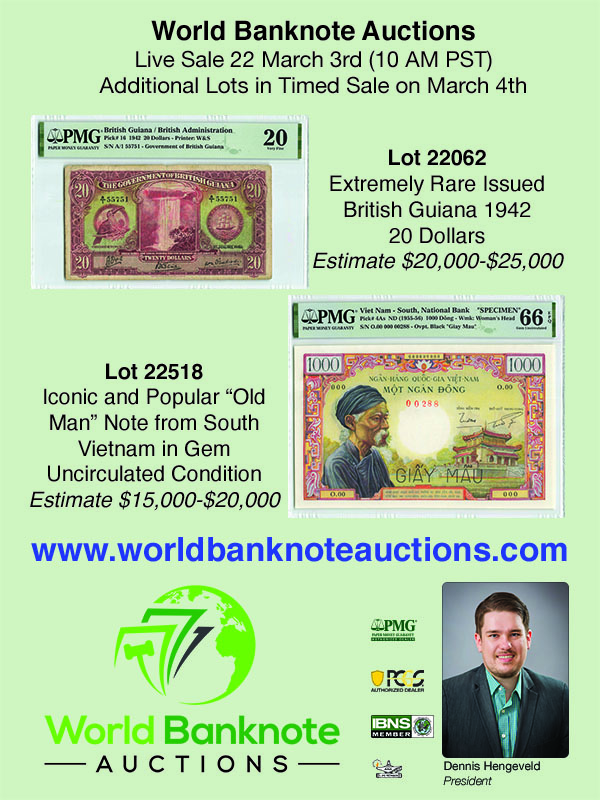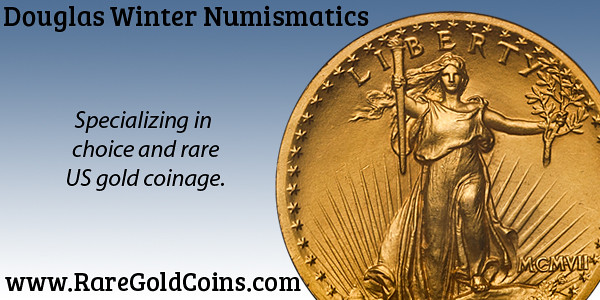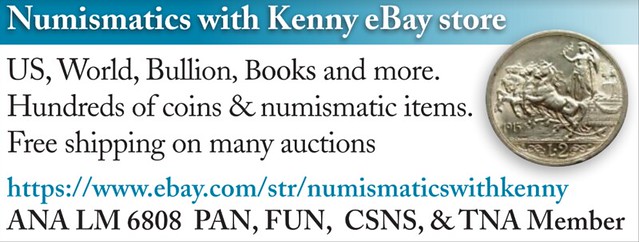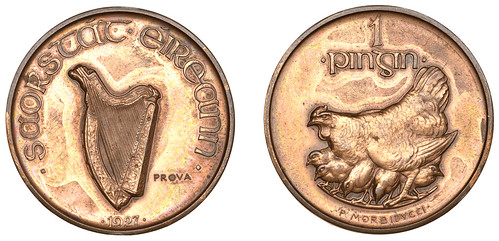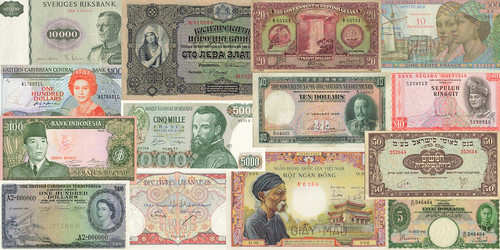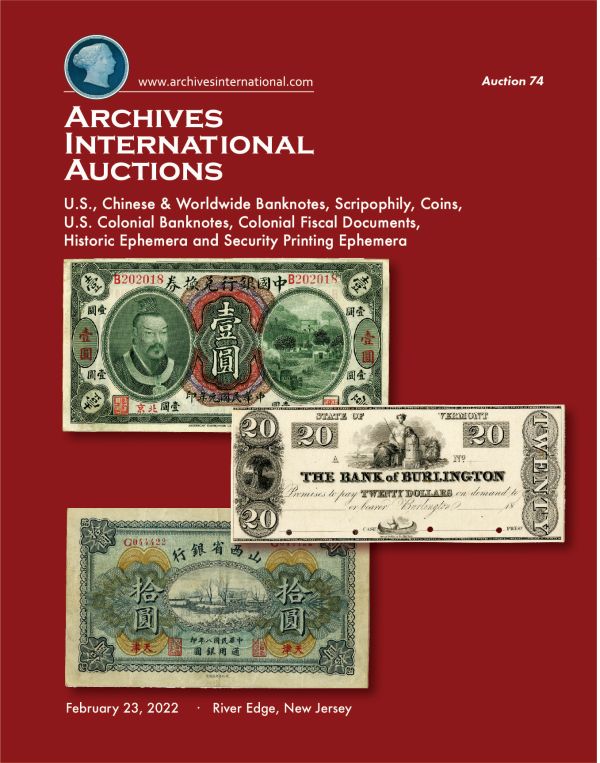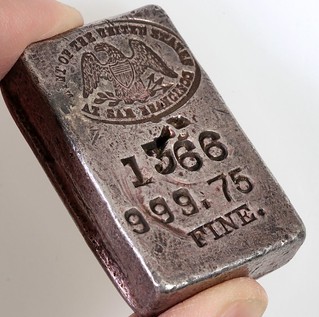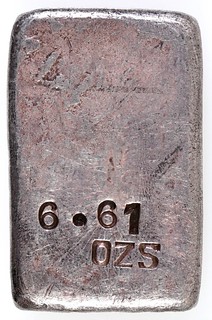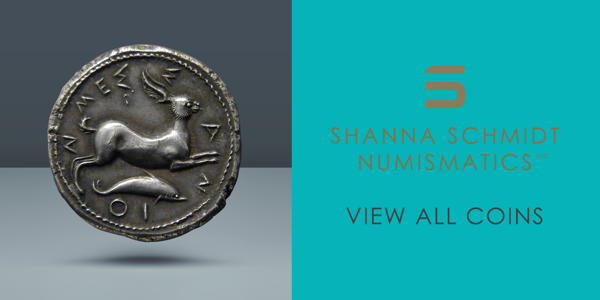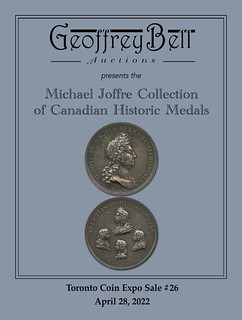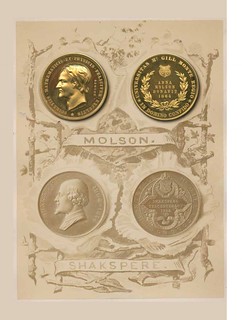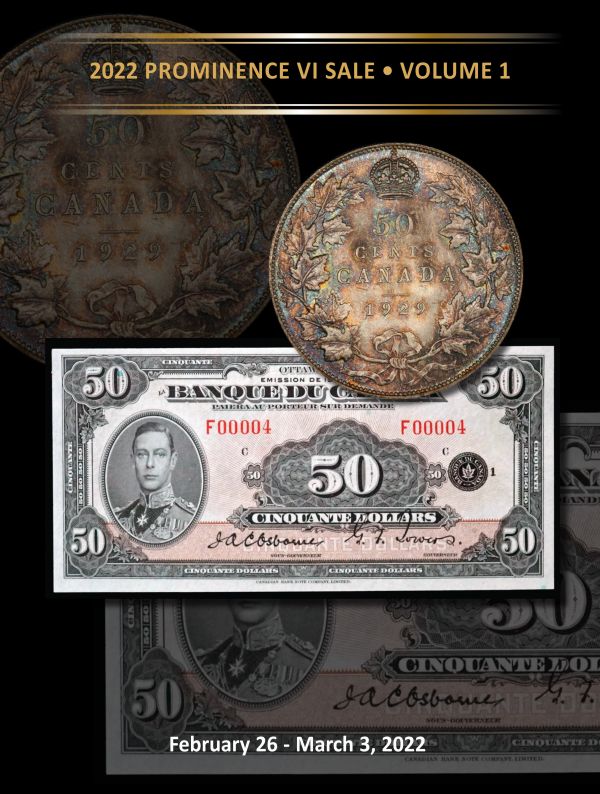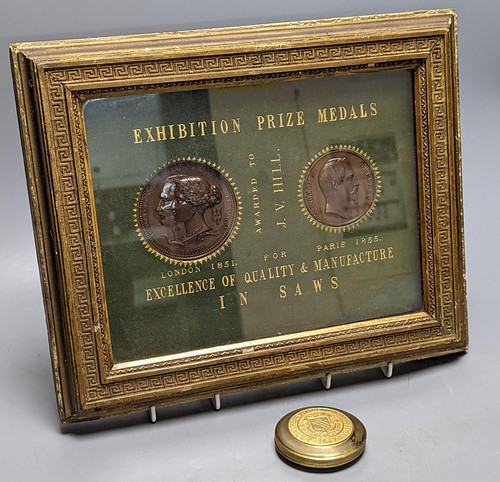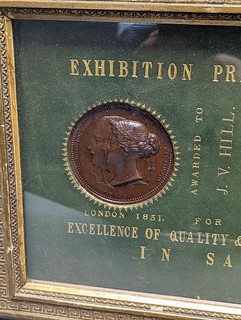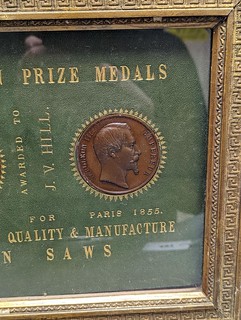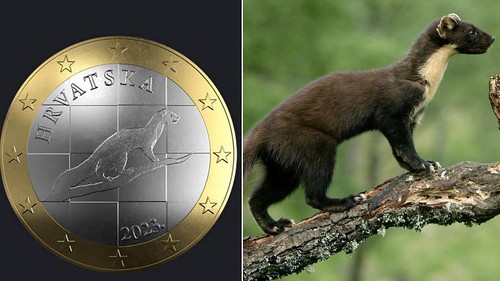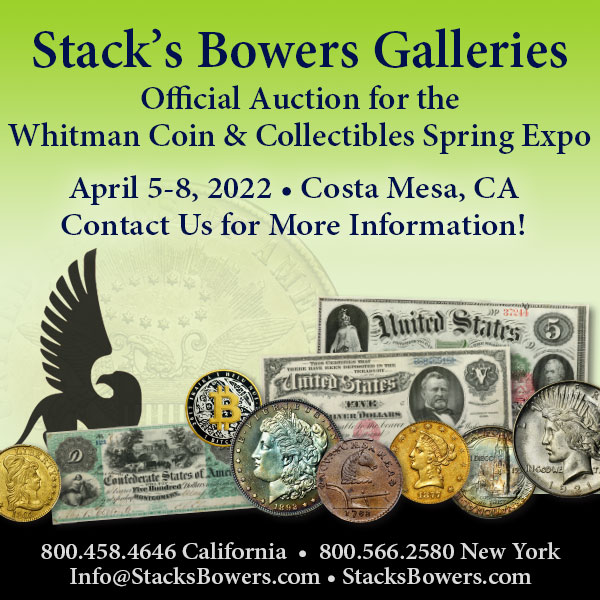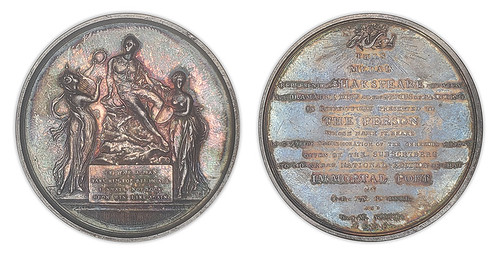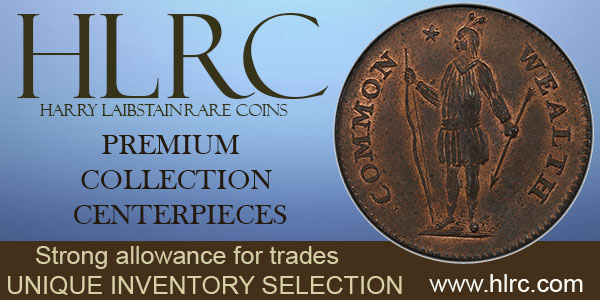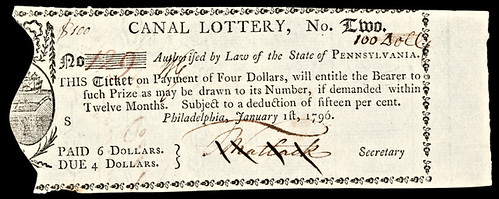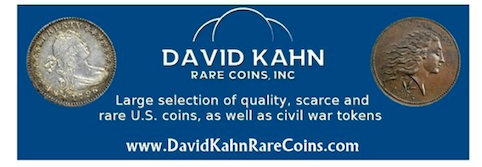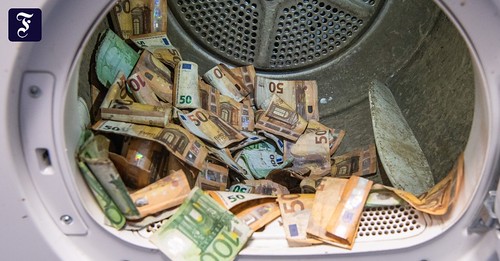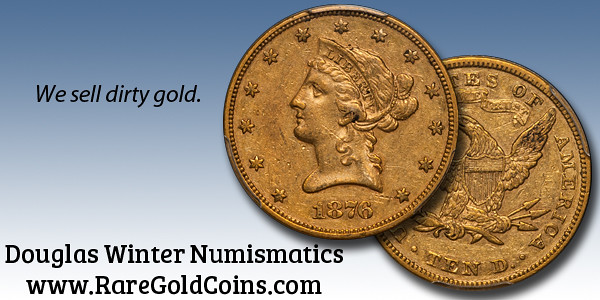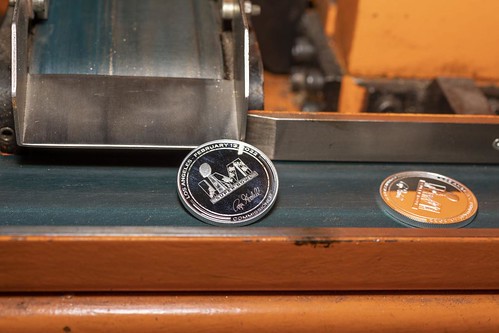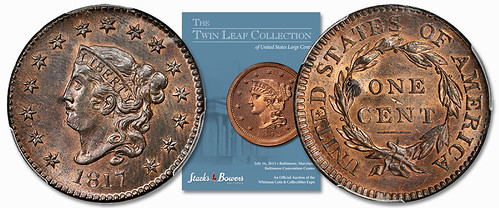
Visit our NBS Sponsors


About UsThe Numismatic Bibliomania Society is a non-profit association devoted to the study and enjoyment of numismatic literature. For more information please see our web site at coinbooks.org SubscriptionsThose wishing to become new E-Sylum subscribers (or wishing to Unsubscribe) can go to the following web page link MembershipThere is a membership application available on the web site Membership Application To join, print the application and return it with your check to the address printed on the application. Print/Digital membership is $40 to addresses in the U.S., and $60 elsewhere. A digital-only membership is available for $25. For those without web access, write to: Charles Heck, Treasurer AsylumFor Asylum mailing address changes and other membership questions, contact Chuck at this email address: treasurer@coinbooks.org SubmissionsTo submit items for publication in The E-Sylum, write to the Editor at this address: whomren@gmail.com BUY THE BOOK BEFORE THE COIN |
- WAYNE'S WORDS: THE E-SYLUM FEBRUARY 13, 2022
- KOLBE & FANNING BUY OR BID SALE NUMBER 18
- NEW BOOK: COPPER COINS OF MUSCAT & OMAN
- NEW BOOK: DUTCH EAST INDIES PLANTATION TOKENS
- NEW BOOK: SUMATRA ESTATES PAPER MONEY 2ND
- NEW JOURNAL: STUDIA NUMMORUM
- ROGER H. DURAND (1935-2022)
- THE VALENTINE MEDAL
- KIMBERLY DUMAS JOINS NEWMAN PORTAL STAFF
- VIDEO: TULSA COIN SHOW
- PENNY DRESSES AND TANGUAY PENNIES
- NOTES FROM E-SYLUM READERS: FEBRUARY 13, 2022
- ANS BURNETT CHAIR OF ROMAN NUMISMATICS
- 8,000+ ROMAN IMPERIAL COINS ADDED TO OCRE
- BRITISH MUSEUM KEEPER OF COINS AND MEDALS
- ORIGINS OF THE GERMAN COIN TRADE
- VOCABULARY TERM: HOLLOWBACK
- WHO WAS THE FIRST COIN COLLECTOR?
- DON EVERHART'S CAREER IN COINS, PART 3
- STEPHEN ALBUM RARE COINS AUCTION 42 RESULTS
- ROSA AMERICANA COLONIAL COINS PRICE LIST #22
- DIX NOONAN WEBB OFFER IRISH COINS
- WORLD BANKNOTE AUCTIONS SALE 22
- HOLABIRD FEBRUARY 2022 SALE SELECTIONS
- JOFFRE CANADIAN HISTORICAL MEDALS COLLECTION
- NUMISMATIC NUGGETS: FEBRUARY 13, 2022
- CROATIAN COIN COPYRIGHT CONTROVERSY
- SHAKESPEARE MEDAL REUNITED WITH FAMILY
- 1796 CANAL LOTTERY TICKET
- BUNDESBANK DRIES FLOOD MONEY
- HIGHLAND MINT MAKES SUPERBOWL LVI COINS
- LOOSE CHANGE: FEBRUARY 13, 2022
- GLUE AND THE ART OF NUMISMATIC REPAIRS
Click here to read the thin version on the web
Click here to subscribe
Click here to access the complete archive
To comment or submit articles, reply to whomren@gmail.com
Content presented in The E-Sylum is not necessarily researched or independently fact-checked, and views expressed do not necessarily represent those of the Numismatic Bibliomania Society.
WAYNE'S WORDS: THE E-SYLUM FEBRUARY 13, 2022
 New subscribers this week include:
Michael Ball,
Kimberly Dumas, and
Rob Luton.
Welcome aboard! We now have 6,880 subscribers.
New subscribers this week include:
Michael Ball,
Kimberly Dumas, and
Rob Luton.
Welcome aboard! We now have 6,880 subscribers.
This is another big issue, and my apologies to those who've forwarded comments and articles that didn't make it into this issue. Some will appear next week.
Thank you for reading The E-Sylum. If you enjoy it, please send me the email addresses of friends you think may enjoy it as well and I'll send them a subscription. Contact me at whomren@gmail.com anytime regarding your subscription, or questions, comments or suggestions about our content.
This week we open with a numismatic literature sale, four new books, a new journal, updates from the Newman Numismatic Portal, penny dresses, and more.
Other topics this week include the Valentine medal, Tanguay pennies, Roman Imperial coinage, Don Everhart, Roger Durand, Andrew Burnett, auction previews, colonial coins and lottery tickets, Canadian historical medals, and Superbowl coins.
To learn more about the coins of Muscat & Oman, Santa Claus notes, Daniel W. Valentine, provenance and scholarship, origins of the German coin trade, the first coin collector, feather coil money, the Free State Penny, Goldfield Miners Union Scrip, the New York City Draft Riot and Greg's Grill Garden, read on. Have a great week, everyone!
Wayne Homren
Editor, The E-Sylum
KOLBE & FANNING BUY OR BID SALE NUMBER 18
Numismatic Booksellers Kolbe & Fanning submitted this announcement of their eighteenth "Buy or Bid Sale" which closes on February 21, 2022. Good luck, everyone! -Editor
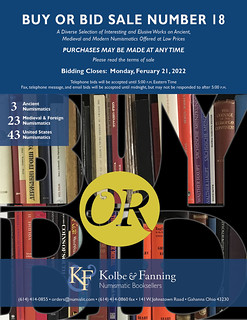 Kolbe & Fanning Numismatic Booksellers have announced our latest
Kolbe & Fanning Numismatic Booksellers have announced our latest Buy or Bid Sale,
which begins now and will close on Monday, February 21, 2022. With hundreds of new additions, the sale focuses on modestly priced books, giving collectors an opportunity to add to their libraries at minimal cost.
The sale includes over 1600 works on ancient, medieval and modern coins, as well as general works, periodicals and sale catalogues. Buy
prices have been kept low to promote sales. To further encourage participation, the firm is offering free domestic shipping to bidders spending at least $300; there is also no packing and processing fee for this sale. Again, please read the Terms of Sale before participating.
NEW BOOK: COPPER COINS OF MUSCAT & OMAN
Mahdi Bseiso submitted this announcement of a new book on the coins of Muscat & Oman. Thanks. -Editor
NEW BOOK: DUTCH EAST INDIES PLANTATION TOKENS
The 5th edition of Adrian Lansen's book on plantation tokens of the Dutch East Indies has been published. -Editor
This new 5th edition lists 362 tokens with description, including one new Estate: Bajoelor, 8 new discovered tokens, 50 tokens provided with new data and 7 new token images. A detailed description is also given of the estates and companies that issued these tokens.
NEW BOOK: SUMATRA ESTATES PAPER MONEY 2ND
Adrian Lansen has published a new edition of his book on the paper money of the estates of Sumatra. Here's the announcement. -Editor
Now available a new, revised, publication about the paper money used on the estates on Sumatra in the period 1876 – 1906. This second revised edition includes new additional information. A full detailed description is given of 16, mainly tobacco, companies, which issued 88 different notes. These notes are described in detail and all are illustrated in colour. The publication is completely bilingual English-Dutch, with transcriptions of the headings on the notes in Chinese, Malay and Tamil.
NEW JOURNAL: STUDIA NUMMORUM
Roma Numismatics is offering a new online journal. Here's the announcement. -Editor
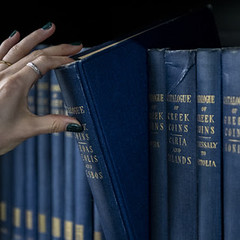 Today we are pleased to announce the inauguration of Studia Nummorum, a new online journal for the publication of numismatic studies and research which can be found on Roma Numismatics' website. Studia Nummorum has been developed as a facility to enable all researchers to have their work published for the immediate and cost-free benefit of all: as a free-to-access service published on an ad-hoc basis there are no deadlines and no wait times for publication.
Today we are pleased to announce the inauguration of Studia Nummorum, a new online journal for the publication of numismatic studies and research which can be found on Roma Numismatics' website. Studia Nummorum has been developed as a facility to enable all researchers to have their work published for the immediate and cost-free benefit of all: as a free-to-access service published on an ad-hoc basis there are no deadlines and no wait times for publication.
It is our hope that all students and researchers of numismatics, whether actively engaged in either academia or private collecting, will benefit from the leading-edge research and information that will be permanently archived at Studia Nummorum.
ROGER H. DURAND (1935-2022)
Numismatic researcher and author Roger H. Durand has passed. John Ferreri of NENA submitted these notes. -Editor
The New England Numismatic Association is sad to announce the passing of member Roger H. Durand, collector and author of U.S. Obsolete Currency books. He was predeceased by his second wife, Cheryl. He is survived by his first wife, Claire and his daughter Karen and three sons, Roger, Jr, Timothy and Christopher.
THE VALENTINE MEDAL
Newman Numismatic Portal Project Coordinator Len Augsburger provided this summary of material relating to the portrait medal of author Daniel W. Valentine. Thanks. -Editor
The Valentine Medal
KIMBERLY DUMAS JOINS NEWMAN PORTAL STAFF
Newman Numismatic Portal Project Coordinator Len Augsburger also provided the following update. Thanks. -Editor
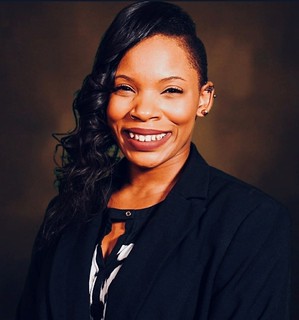 Newman Portal welcomes new staff member Kimberly Dumas, who joins the NNP project at Washington University in St. Louis as Library Technical Assistant. She holds a BA in History from the University of Houston and recently graduated from the University of Illinois (Champaign) with an MA in Library Science.
Newman Portal welcomes new staff member Kimberly Dumas, who joins the NNP project at Washington University in St. Louis as Library Technical Assistant. She holds a BA in History from the University of Houston and recently graduated from the University of Illinois (Champaign) with an MA in Library Science.
Dumas will manage the scanning queues in St. Louis, coordinating material, student staff, scanning equipment, and a host of other tasks. She has already made her first addition to the site, a run of Trade Token Topics from 1971-1982. Welcome, Kim!
VIDEO: TULSA COIN SHOW
These are selections from the David Lisot Video Library that feature news and personalities from the world of coin collecting. David has been attending coin conventions since 1972 and began videotaping in 1985. The Newman Numismatic Portal now lists all David's videos on their website at:
https://nnp.wustl.edu/library/multimediadetail/522852
Here's one on Tulsa Coin Show. -Editor
Oklahoma Numismatic Association President Chris Harrell Talks About Why Come to Tulsa Coin Show.
VIDEO: 4:37.
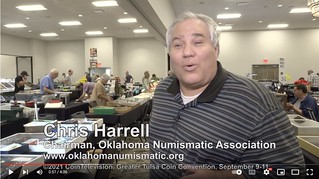 Chris Harrell, President, Oklahoma Numismatic Association,
Chris Harrell, President, Oklahoma Numismatic Association,
David Lisot, Interviewer, CoinTelevision.com. September 9-11, 2021.
Two times a year Oklahoma becomes a destination spot for coin dealers and collectors. The Oklahoma Numismatic Association hosts their annual coin conventions as part of their ongoing efforts to promote coin collecting. Find out from ONA President Chris Harrell what is involved.
David adds:
"Folks might want to tune in to the coin show in Oklahoma. The Oklahoma Numismatic Association put on a great coin convention. Listen to convention chairman Chris Harrell explain why."
An excerpt of the video is available for viewing on the Coin Television YouTube Channel at:
https://youtu.be/C_m1Q14D3-E
PENNY DRESSES AND TANGUAY PENNIES
Wayne Pearson writes:
"I liked the dress of 2000 cents. Pretty cool."
Agreed. But in the nothing-new-under-the-sun department, Julia Casey reports that the penny dress has been tried at least once before - in 1910! Very, very cool - thanks! -Editor
NOTES FROM E-SYLUM READERS: FEBRUARY 13, 2022
On Provenance and Scholarship
Bill Eckberg writes:
"Ron Guth's project to identify Eliasberg coins and reunite them with their provenance is most interesting and, at least to me, important. Those of us for whom provenance and scholarship are significant seem to be in the minority in numismatics these days.
"It is not surprising that important coins from such collections have been separated from their provenances. I have no doubt that gradeflation and greed are the two overlapping reasons. Everybody knows that 65 is a higher number than 63, right? So, obviously any MS65 coin must be better than any MS63. Why would an auction house admit that their magnificent MS65 gem was once considered a lowly MS63? More money is to be made off a gem UNC than a mere choice UNC, even when they are the exact same piece.
"It's sad that numismatics has become an industry more than a hobby, and the number on the little piece of paper in the plastic is more important than that round, metal thing packaged with it."
To read the earlier E-Sylum article, see:
REDISCOVERING ELIASBERG'S CONTINENTAL DOLLAR
(https://www.coinbooks.org/v25/esylum_v25n06a12.html)
Other topics this week include the Man-or-Mouse tokens, and the Fernand David collection. -Editor
ANS BURNETT CHAIR OF ROMAN NUMISMATICS
The ANS has endowed a new chair of Roman Numismatics. Here's the press release. -Editor
The American Numismatic Society (ANS) is pleased to announce the establishment of the Andrew M. Burnett Chair of Roman Numismatics.
The newly endowed chair is named in honor of renowned numismatist, scholar, and ANS Board of Trustees Vice President Andrew M. Burnett and is funded by an anonymous donor.
THE BOOK BAZARRE
8,000+ ROMAN IMPERIAL COINS ADDED TO OCRE
A large batch of Roman Imperial Coins has been added to the OCRE database. -Editor
More than 8,000 Roman Imperial coins from the Bibliothèque nationale de France have been integrated into Online Coins of the Roman Empire. This is a significant addition to the project, but does not represent the fully body of the BnF's material. The import includes the issues from Augustus to Trajan, a portion of the Hadrianic collection, and later coins from Carus to Diocletian.
BRITISH MUSEUM KEEPER OF COINS AND MEDALS
There's a position opening for Keeper of Coins and Medals at the British Museum, one of the most important coin departments in the world. Here's how to apply. -Editor
The British Museum is looking to appoint an outstanding researcher in the field of numismatics or related disciplines to lead and manage its team of specialist curators in the department of Coins and Medals. This is an exciting opportunity to transform the department's profile and activity in support of the Rosetta Project – the Museum's ambitious masterplan –– and the Museum's cross-disciplinary research programme.
ORIGINS OF THE GERMAN COIN TRADE
Künker issued this press release consisting of a new article by Ursula Kampmann on the origins of the German coin trade. -Editor
To mark the auction of the Salton collection, Künker and Stack's Bowers Galleries asked historian Ursula Kampmann to research the history of the Hamburger-Schlessinger coin trading dynasty. Her findings have revolutionized our knowledge of the German coin trade.
VOCABULARY TERM: HOLLOWBACK
Here's another entry from Dick Johnson's Encyclopedia of Coin and Medal Terminology. -Editor
Hollowback. Medals, checks, badges and pins made by the processes and equipment of the stencil industry rather than typical medal making. Such items are also called stamp and stencil and are identified by the following characteristics: (1) thin – struck on sheet brass; (2) uniface – only one die with a design is used; (3) low relief – little depth to the design; (4) usually blanked or trimmed unusual shape (since it is just as easy to blank in unusual shape as a round piece); (5) coin finish – no finish other than that of the struck brass; (6) possible flat back – (the back is the incuse of the obverse, after all it is a SHELL} very infrequently a separate BACKPLATE is applied to close off the back side. They are made at far lower cost than typical medals.
WHO WAS THE FIRST COIN COLLECTOR?
American Numismatic Biographies author Pete Smith submitted this article with a great question: Who was the first coin collector?. Thanks! -Editor
Sometime around 600 BCE, a merchant east of Troy in the Kingdom of Lydia looked at two coins and noticed they were different. He set them aside and compared them as he acquired other coins. Unfortunately, Greek historian Herodotus did not record his name or a description of the extent of his collection.
Hoards of coins of a single type are studied as a representation of commerce at the time. When a hoard contains coins of all different types, it is considered to represent a systematic collection. Such early hoards have been found but not linked to a specific collector.
DON EVERHART'S CAREER IN COINS, PART 3
With permission, we're republishing excerpts of former U.S. Mint Sculptor-Engraver Don Everhart series published by CoinWeek beginning in April 2018. Last week Don wrote about how he came to enter a design contest for the second Clinton inaugural medal. -Editor
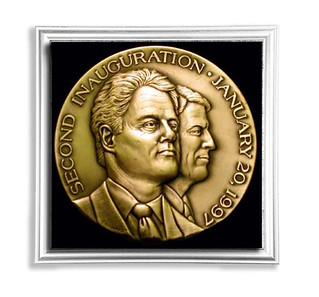 I worked for six weeks on the project and waited about a month until one day I received a call from Bob. I picked up the phone and waited in silence for quite a while until he uttered,
I worked for six weeks on the project and waited about a month until one day I received a call from Bob. I picked up the phone and waited in silence for quite a while until he uttered, Congratulations!
Needless to say, I was ecstatic.
I always enjoyed working from my own studio. I was my own boss and I could work my own hours. No commute, no early morning wake up call, etc. Most all the time I was very busy, and when I wasn't busy I hustled to get more work. Many days were spent on the phone or trips to New York for the annual giftware shows at the Javitts Center.
STEPHEN ALBUM RARE COINS AUCTION 42 RESULTS
Here's a press release with results for the Stephen Album Rare Coins Auction 42. More great prices! -Editor
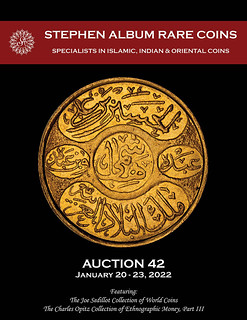 Stephen Album Rare Coins held its Auction 42 on January 20-23, 2022 at its offices in Santa Rosa, California. The
prices realized were yet another new record for the company coming in at $2.63 million (including buyer's fees)
with a sell-through rate of 97.4%. Some sections such as the Chinese coins achieved a nearly 100% sell-through rate.
Stephen Album Rare Coins held its Auction 42 on January 20-23, 2022 at its offices in Santa Rosa, California. The
prices realized were yet another new record for the company coming in at $2.63 million (including buyer's fees)
with a sell-through rate of 97.4%. Some sections such as the Chinese coins achieved a nearly 100% sell-through rate.
Many items went for multiples of their estimates, including some world record results. Several collections helped achieve those totals, namely the Joe Sedillot Collection of World Coins, Part I, and the Charles Opitz Collection of Ethnographic Money, Part III.
ROSA AMERICANA COLONIAL COINS PRICE LIST #22
E-Sylum supporter Jeff Rock of Rosa Americana, LTD has issued a new fixed price list of U.S. colonial coins. Here's his summary description and some sample pages. Great material here, with excellent writeups. To get your copy, contact Jeff at rosaamltd@gmail.com . -Editor
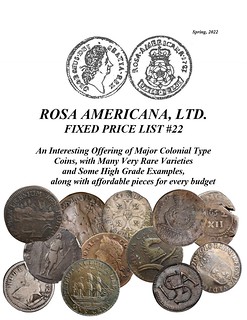 FPL#22 in 2022 has a good ring to it. While we are not out of the Covid pandemic things are getting better in most areas, and we have seen a return (admittedly spotty) to coin shows and life as we knew it prior to 2020. The C4 convention in Baltimore last November went on as planned, and though it was less crowded than in previous years, the energy and fun was there.
What wasn't there were a lot of colonial coins to buy – demand seems to have far outstripped supply, and as everyone who has bid in auctions recently knows, that has led to increased prices nearly across the board.
FPL#22 in 2022 has a good ring to it. While we are not out of the Covid pandemic things are getting better in most areas, and we have seen a return (admittedly spotty) to coin shows and life as we knew it prior to 2020. The C4 convention in Baltimore last November went on as planned, and though it was less crowded than in previous years, the energy and fun was there.
What wasn't there were a lot of colonial coins to buy – demand seems to have far outstripped supply, and as everyone who has bid in auctions recently knows, that has led to increased prices nearly across the board.
One of the few good things that seems to have come from this pandemic is that people are turning back to hobbies of their youth – or finding new ones – and numismatics in general has been the beneficiary of that increased interest. There were new faces at the C4 convention (as well as on the Google discussion group – which if you haven't yet joined you should, contact me for details!), both collectors and dealers, and that is gratifying to see.
DIX NOONAN WEBB OFFER IRISH COINS
Dix Noonan Webb are offering an interesting sale of Irish coins, tokens and medals on March 3, 2022. -Editor
An intriguing and extremely rare Irish coin dating from 1927 that was designed by an Italian but was never put into circulation is among the highlights of the sale of Irish Coins, Tokens and Historical Medals by Mayfair-based international coins, medals, banknotes and jewellery specialists Dix Noonan Webb on Thursday, March 3, 2022.
Known as the Free State Penny (1921-1937), the bronze penny in the sale, which is decorated with a harp on one side, and hens and chickens on the other, was designed by Roman sculptor Publio Morbiducci (1889-1963) for the competition to design Ireland's new money in 1928. He was ultimately unsuccessful and the precise numbers of pieces which now exist are uncertain. In 1976, it is believed that only three pieces existed in bronze. It is estimated at £4,000-5,000 and is part of a collection that was amassed between 1972 and 1978 by a gentleman and is being offered at auction for the first time.
THE BOOK BAZARRE
WORLD BANKNOTE AUCTIONS SALE 22
Here's the press release for World Banknote Auctions upcoming Live Sale 22. Some very nice notes here. -Editor
This week World Banknote Auctions has listed Live Sale 22, which closes in two different segments. The first segment, the traditional live sale, closes on March 3, 2022, with live bidding that day at 1 PM Eastern / 10 AM Pacific. The following day, on March 4th at 1 PM Eastern / 10 AM Pacific an additional segment closes in a timed auction (no live bidding, although lots may be extended if a bid is received 10 minutes before closing). Live Sale 22 offers 790 lots from around the world, with select highlights including key notes from around the world, classic type notes and modern issues in high grade. Some highlights are selected below, the entire catalog can be viewed on the company's website, www.worldbanknoteauctions.com.
HOLABIRD FEBRUARY 2022 SALE SELECTIONS
Here are some numismatic items that caught my eye in the February 2022 Holabird Western Americana Collections LLC sale. -Editor
Old style, pre World War II logo of the Mint of the United States at San Francisco. Number 1366 / 999.75 / Fine. Reverse: 6.61 ozs.
JOFFRE CANADIAN HISTORICAL MEDALS COLLECTION
Geoffrey Bell Auctions April 28, 2022 Toronto Coin Expo Sale #26 sale features the Michael Joffre Collection of Canadian Historical Medals, catalogued by Jacob Lipson. An article written by the consigner describes his numismatic journey. -Editor
Michael Joffre Collection of Canadian Historical Medals
In 1979, as an eight year old boy, I stumbled across a jar of old European coins in my grandfather's house. Upon discovering me on the floor with 100's of coins scattered around, he told me I could choose any one I wanted to keep. The Sweden 1736 1 Ore in VG that I selected started a collecting bug and has led to an incredible numismatic journey that has been one of my great passions in life.
The first LeRoux medal I acquired was as a teenager: a LeRoux 1875. That piece sat in a drawer, and I looked at it every now and then and wondered what other Canadian medals were available. During the years that followed, I collected in many numismatic areas — Roman, French, English, and American — but neglected to explore further Canadian medals.
In the early 2000s, my good friend and numismatic mentor Bill Whetstone acquired a nice collection of French coins, which included some very interesting medals (including the classic 1760 Montreal Taken medal in silver), he agreed to sell the whole group to me … and the medal voyage had truly begun.
NUMISMATIC NUGGETS: FEBRUARY 13, 2022
Here's a selection of interesting or unusual items I came across in the marketplace this week. Tell us what you think of some of these. -Editor
Two Exhibition Prize Medals, to JV Hill, saw manufacturers, London 1851 and Paris 1855, frame 34cm. wide, and a collection of Victorian coin tokens, in Pinches & Co. case, 1857
Nice framed display set. -Editor
To read the complete lot description, see:
(https://www.easyliveauction.com/catalogue/lot/
347d1e5d9ec08870f264436833da8068/0af8d24542e81eb9357e7ef448a6646f/
gorringes-antiques-auction-furniture-miscellaneous-lot-497/)
Other topics this week include a Morgan Dollar Prize Medal, and Greg's Grill Garden Token. -Editor
CROATIAN COIN COPYRIGHT CONTROVERSY
David Sundman shared this article about the Croatian coin copyright controversy. Thanks! He writes, "Interesting article here, both the copyright issues and the origin of the ‘kuna' unit of currency." -Editor
A Scottish photographer has blocked the release of a Croatian coin because he believes it breaches copyright by featuring his work.
Iain Leach, 63, took a picture of a pine marten on a tree branch on June 8, 2005, in Scotland.
He was baffled to learn that a near-identical picture won a contest for a €1 coin, to be launched next year when Croatia joins the euro.
SHAKESPEARE MEDAL REUNITED WITH FAMILY
An ANS Pocket Change article published last month describes an interesting William Shakespeare medal recently deaccessioned by the society. Here's an excerpt - see the complete article online for more. -Editor
One of the more fascinating aspects of the American Numismatic Society's eBay store are the numismatic stories that come with the objects we are privileged to offer. While every object has a story to tell, we aren't always privy to the full story, apart from what we know about how they were made, who issued them, and where they circulated generally. But certain specifics—exactly whose hands something passed through, for example—are often lost to time, with the exception of pedigreed objects and the like. However, when the provenance or previous ownership of an item isn't committed to paper, it is sometimes committed to the object itself in the form of an inscription or engraving.
1796 CANAL LOTTERY TICKET
While not exactly numismatic, early lottery tickets are an interesting adjunct to collections of early paper money. Often printed by the same firms using the same technology as paper money, they provide a fascinating glimpse into the colonial era. This item in the February 26, 2022 Early American History Auctions sale is a ticket that helped fund a failed Philadelphia-area infrastructure project. -Editor
January 1, 1796-Dated Federal Period, Philadelphia, Pennsylvania, CANAL LOTTERY, No. Two.
(for the Schuylkill & Susquehanna, and Delaware & Schuylkill Canal Company), Winning Ticket with $100 Doll
written on its face and winner's names on back, Choice Extremely Fine.
BUNDESBANK DRIES FLOOD MONEY
In the filthy-lucre department, here's a story about how the Bundesbank dried and counted the waterlogged banknotes from the recent flood. -Editor
The Bundesbank processed the flood money from the Ahr Valley using standard household tumble dryers. One of them is now moving to the House of History in Bonn.
It is a very unusual case for the Bundesbank: it has never had to process so much wet and dirty cash as from the flood disaster in the Ahr Valley.
From July 2021 to the end of January 2022, it accepted and refunded notes and coins worth more than 100 million euros.
HIGHLAND MINT MAKES SUPERBOWL LVI COINS
Local news outlets are great for backstories on numismatic artists and makers. Here's an excerpt from an article from Florida about the Highland Mint and Superbowl coins. -Editor
Everyone has a favorite part of their annual Super Bowl viewing experience, whether it be the game, halftime show, commercials or even a combination of all of those things.
But for Brevard residents, the pre-game coin toss may just have a little more meaning.
LOOSE CHANGE: FEBRUARY 13, 2022
Here are some additional items in the media this week that may be of interest. -Editor
A Stack's Bowers blog article by Dave Bowers examines the curious 1817 Cent with 15 stars. -Editor
Perhaps my very favorite cent among those of the 1816 to 1857 years is the 1817 with 15 obverse stars. Designated as N-16, this curious coin defies explanation. Elsewhere in numismatics we have the 1828 half cent and 1832 half eagle with 12 instead of the correct 13 stars, but the 1817 N-16 is off by two in its star count. Why?
To read the complete article, see:
The Curious 1817 Cent with 15 Stars
(https://www.stacksbowers.com/News/Pages/Blogs.aspx?ArticleID=the-1817-large-cent-15-stars)
Other topics this week include Fake Playmoney Cash From Amazon, and Counterfeit Israeli 5- and 10-Shekel Coins. -Editor
GLUE AND THE ART OF NUMISMATIC REPAIRS
In the krazy-koin-konservation department is this thread from the Coin Talk forum about fixing broken wooden nickels. -Editor
User paddyman98 writes:
"I recently received this Wooden Dollar in the mail by member @dwhiz .. Unfortunately it was damaged in the process of it reaching me. It broke into 3 separate pieces.
"But I found the quick fix.. Krazy Glue! Just a tiny dab and it is whole again."

